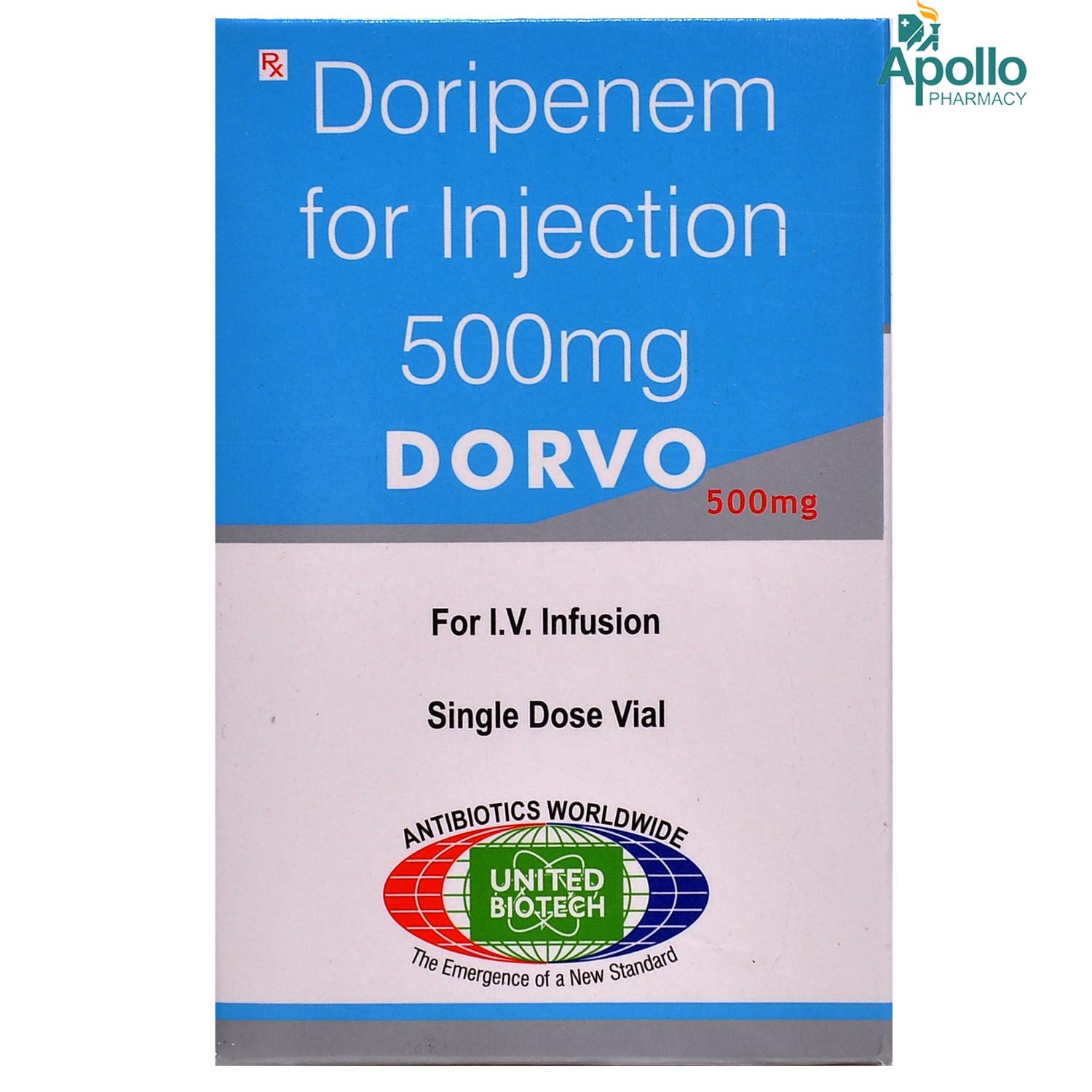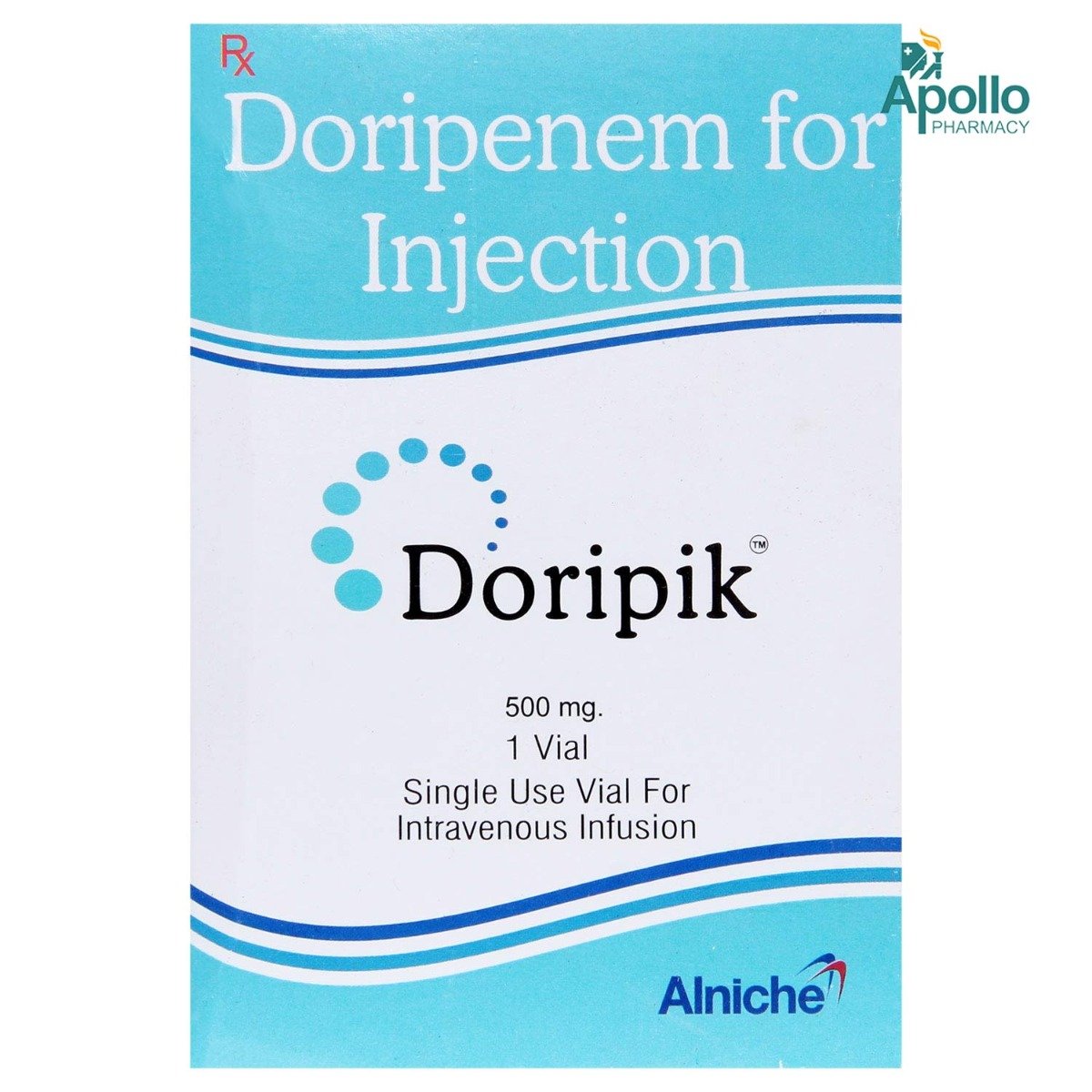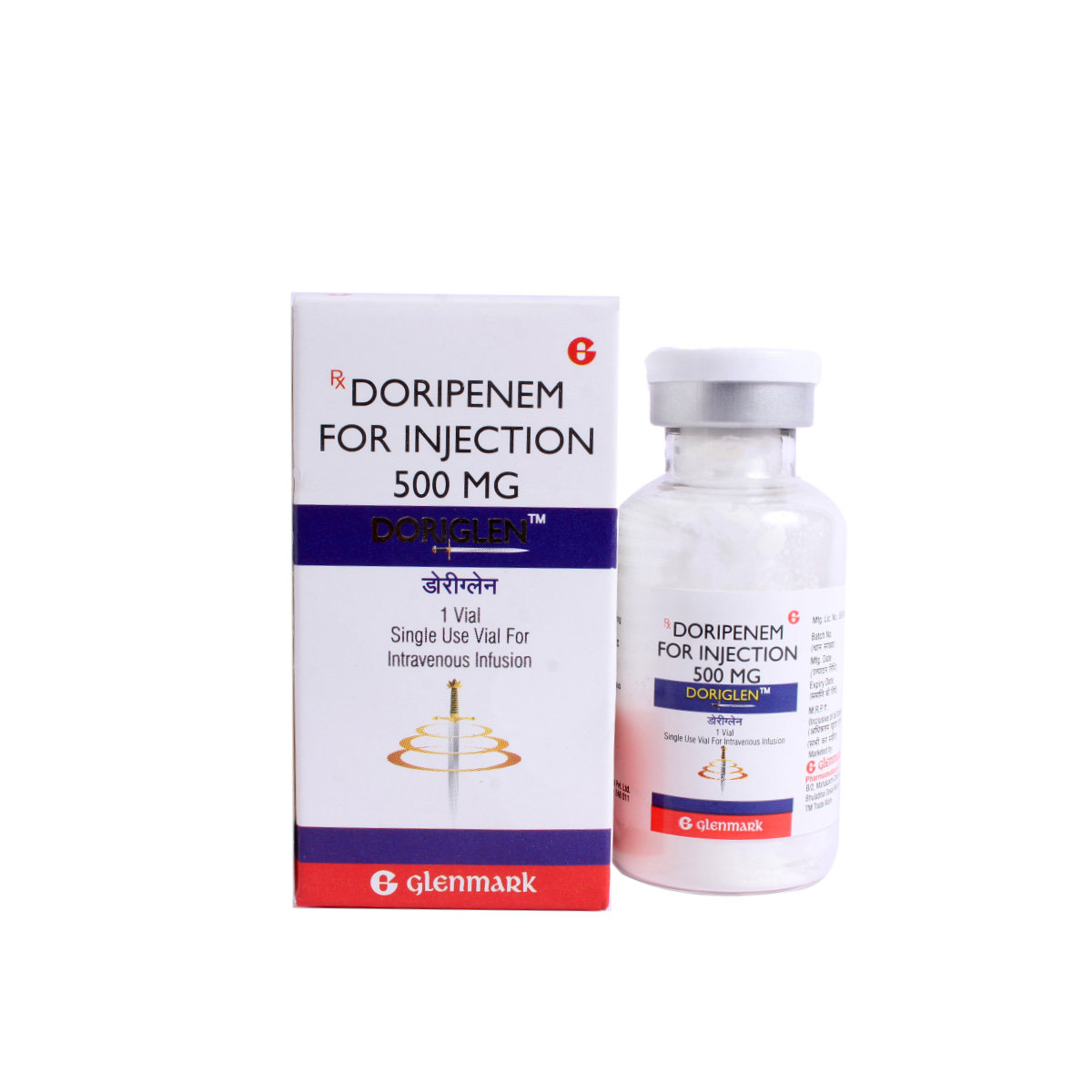Dorimeg 500mg Injection
MRP ₹3250
(Inclusive of all Taxes)
₹487.5 Cashback (15%)
Provide Delivery Location
Online payment accepted
 Prescription drug
Prescription drugWhats That
About Dorimeg 500mg Injection
Dorimeg 500mg Injection belongs to the group of antibiotic medicines called carbapenems. It is indicated in treating bacterial infections such as complicated intra-abdominal infections and complicated urinary tract infections (including pyelonephritis). Bacterial infections are illnesses or conditions caused by bacterial growth or toxins (poisons).
Dorimeg 500mg Injection contains doripenem. Doripenem is an antibacterial drug. It works by inhibiting bacterial enzymes called penicillin-binding proteins (PBPs) and shows a bactericidal effect. Thus, Dorimeg 500mg Injection treats bacterial infections.
Dorimeg 500mg Injection will be administered by a healthcare professional; do not self-administer. Sometimes, Dorimeg 500mg Injection may cause injection site reactions, headaches, nausea, diarrhoea, rash, and phlebitis (vein inflammation). Most of these side effects do not require medical attention and gradually resolve over time. However, if the side effects persist, consult your doctor.
Inform your doctor if you are allergic to any component in Dorimeg 500mg Injection. If you are pregnant or breastfeeding, inform your doctor before taking Dorimeg 500mg Injection. It is not recommended for use in children below 18 as safety and effectiveness have not been established. Keep your doctor up to date on your medical condition and medications to rule out any potential adverse effects or interactions.
Uses of Dorimeg 500mg Injection
Directions for Use
Key Benefits
Dorimeg 500mg Injection contains doripenem. Doripenem is an antibacterial drug. It works by killing bacteria. Thus, Dorimeg 500mg Injection helps treat bacterial infections. It is indicated in treating bacterial infections such as complicated intra-abdominal infections and complicated urinary tract infections (including pyelonephritis).
Storage
- Include iron-rich foods like dark leafy vegetables, lean red meat, legumes and fish in your diet.
- Consume vitamin C-rich foods as they aid iron absorption.
- Limit tea, cocoa, and coffee as these can slow iron absorption.
- Exercise regularly; however, do not overdo it.
- Hydrate your body: Drink enough water to prevent dehydration and headaches.
- Calm Your Mind: Deep breathing and meditation can help you relax and relieve stress.
- Rest and Recharge: Sleep for 7-8 hours to reduce headache triggers.
- Take rest: lie down in a quiet, dark environment.
- Cold or warm compresses can help reduce tension.
- Stay Upright: Maintain good posture to keep symptoms from getting worse.
- To treat headaches naturally, try acupuncture or massage therapy.
- Over-the-counter pain relievers include acetaminophen and ibuprofen.
- Prescription Assistance: Speak with your doctor about more substantial drug alternatives.
- Severe Headaches: Seek emergency medical assistance for sudden, severe headaches.
- Frequent Headaches: If you get reoccurring headaches, consult your doctor.
- Headaches with Symptoms: Seek medical attention if your headaches include fever, disorientation, or weakness.
- Inform your doctor about the nausea and discuss possible alternatives to the medication or adjustments to the dosage.
- Divide your daily food intake into smaller, more frequent meals to reduce nausea.
- Opt for bland, easily digestible foods like crackers, toast, plain rice, bananas, and applesauce.
- Avoid certain foods that can trigger nausea, such as fatty, greasy, spicy, and smelly foods.
- Drink plenty of fluids, such as water, clear broth, or electrolyte-rich beverages like coconut water or sports drinks.
- Use ginger (tea, ale, or candies) to help relieve nausea.
- Get adequate rest and also avoid strenuous activities that can worsen nausea.
- Talk to your doctor about taking anti-nausea medication if your nausea is severe.
- Record when your nausea occurs, what triggers it, and what provides relief to help you identify patterns and manage your symptoms more effectively.
- Inform Your Doctor: Notify your doctor immediately about your diarrhoea symptoms. This allows them to adjust your medication or provide guidance on managing side effects.
- Stay Hydrated: Drink plenty of fluids to replace lost water and electrolytes. Choose water, clear broth, and electrolyte-rich drinks. Avoid carbonated or caffeinated beverages to effectively rehydrate your body.
- Follow a Bland Diet: Eat easy-to-digest foods to help firm up your stool and settle your stomach. Try incorporating bananas, rice, applesauce, toast, plain crackers, and boiled vegetables into your diet.
- Avoid Trigger Foods: Steer clear of foods that can worsen diarrhoea, such as spicy, fatty, or greasy foods, high-fibre foods, and dairy products (especially if you're lactose intolerant).
- Practice Good Hygiene: Maintain good hygiene to prevent the spread of infection. To stay healthy, wash your hands frequently, clean and disinfect surfaces regularly, and avoid exchanging personal belongings with others.
- Take Anti-Diarrheal Medications: If your doctor advises, anti-diarrheal medications such as loperamide might help manage diarrhoea symptoms. Always follow your doctor's directions.
- Keep track of your diarrhoea symptoms. If they don't get better or worse or are accompanied by severe stomach pain, blood, or dehydration signs (like extreme thirst or dark urine), seek medical help.
- Skin rash caused by allergies is due to irritants or allergens. Therefore, avoid contact with such irritants.
- Consult your doctor for proper medication and apply an anti-itch medication. Follow the schedule and use the medication whenever needed.
- Protect your skin from extreme heat and try to apply wet compresses.
- Soak in the cool bath, which gives a soothing impact to the affected area.
- If you have symptoms such as pain, swelling, redness, or warmth in your veins after taking medication, contact your doctor right once. Share information about your symptoms, medication regimen, and medical history.
- Your doctor will then assess your medication regimen to determine if it's contributing to the thrombophlebitis. This assessment will help identify the best course of action to manage your condition and prevent further complications.
- Your doctor may suggest certain diet and lifestyle changes to help manage your condition. This may include increasing your intake of foods rich in omega-3 fatty acids, staying hydrated, exercising regularly, and maintaining a healthy weight. Your doctor may also advise medications to reduce inflammation, prevent blood clots, or manage pain if necessary.
- If your condition does not improve or persists, consult your doctor and report your condition. Your doctor will assess your progress, adjust your treatment plan if necessary, and provide appropriate advice to ensure the best possible outcome.
- High levels of liver enzymes need immediate medical attention.
- Watch your diet and consume low-fat foods, like green leafy vegetables, fish, whole grains, nuts, etc.
- Regularly do strengthening exercises to control your cholesterol levels.
- Avoid drinking alcohol as it can affect your liver.
- Focus on losing weight as it can help control cholesterol and maintain liver enzymes.
- Practice yoga and meditation to improve liver functioning and overall health.
Drug Warnings
Dorimeg 500mg Injection is contraindicated in patients with known serious hypersensitivity to doripenem, other drugs in the same class, or patients who have demonstrated anaphylactic reactions to beta-lactams. To reduce the development of drug-resistant bacteria and maintain the effectiveness of Dorimeg 500mg Injection should be used only to treat or prevent infections that are proven or strongly suspected to be caused by bacteria. If symptoms worsen or persist or new symptoms appear, patients should stop using the medicine and consult a doctor. Valproic acid lowers serum valproic acid concentrations. Patients with seizure disorders treated with valproic acid or sodium valproate are at a higher risk of having a seizure.
Drug-Drug Interactions
Drug-Drug Interactions
Login/Sign Up
Co-administration of sodium valproate with Dorimeg 500mg Injection can reduce the blood levels of valproic acid.
How to manage the interaction:
Co-administration of Doripenam and sodium valproate can lead to an interaction, it can be taken if advised by your doctor. However, if you experience sudden dizziness, lightheadedness, fainting, shortness of breath, chest pain or tightness, rapid heartbeat, involuntary muscle movements, or memory loss, contact your doctor immediately. Do not discontinue any medications without consulting a doctor.
Co-administration of Divalproex and Dorimeg 500mg Injection can reduce the blood levels of divalproex sodium and increase the risk of developing seizures.
How to manage the interaction:
Co-administration of Divalproex with Dorimeg 500mg Injection can possibly result in an interaction, it can be taken when your doctor has advised it. Do not stop using any medications without first talking to your doctor.
Drug-Food Interactions
Drug-Food Interactions
Login/Sign Up
Diet & Lifestyle Advise
- It would be best to take probiotics after taking the full course of Dorimeg 500mg Injection to restore some healthy bacteria in the intestine that may have been killed. Taking probiotics after antibiotic treatment can reduce the risk of antibiotic-associated diarrhoea. Certain fermented foods like yoghurt, cheese, sauerkraut and kimchi can help restore the intestine's good bacteria.
- Include more fibre-enriched food in your diet, as it can be easily digested by gut bacteria, which helps stimulate their growth. Thus fibre foods may help restore healthy gut bacteria after taking a course of antibiotics. Whole grains, like whole-grain bread and brown rice, should be included in your diet.
- Avoid taking too many calcium-enriched foods and drinks as it might affect the working of Dorimeg 500mg Injection.
- Avoid intake of alcoholic beverages with Dorimeg 500mg Injection as it can make you dehydrated and affect your sleep. This can make it harder for your body to aid the Dorimeg 500mg Injection in fighting off infections.
Side Effects of Dorimeg 500mg Injection
- Redness, pain, or swelling at the injection site
- Headaches
- Nausea
- Diarrhoea
- Rash
- Phlebitis (vein inflammation)
Habit Forming
Therapeutic Class
All Substitutes & Brand Comparisons
RX
Out of StockNot for online saleDORICRIT 500MG INJECTION
Cipla Ltd
₹35.5
(₹31.95 per unit)
98% CHEAPERRX
Not for online saleDorikem 500 mg Injection Kit 1's
Alkem Laboratories Ltd
₹1600
(₹1440.0 per unit)
45% CHEAPERRX
Out of StockNot for online saleDorific 500mg Injection 1's
Gufic Bioscience Ltd
₹1689
(₹1520.1 per unit)
42% CHEAPER
Author Details
We provide you with authentic, trustworthy and relevant information
Drug-Diseases Interactions
Drug-Diseases Interactions
Login/Sign Up
FAQs
Dorimeg 500mg Injection contains doripenem. Doripenem is an antibacterial drug. It works by killing bacteria. Thus, Dorimeg 500mg Injection helps treat bacterial infections.
Caution should be exercised. Patients with seizure disorders who are being treated with valproic acid or sodium valproate are at a higher risk of having a seizure. It has been demonstrated that administering Dorimeg 500mg Injection together with valproic acid lowers its (valproic acid) serum levels.
In some cases, Dorimeg 500mg Injection may lead to Clostridium difficile-associated diarrhoea (ranging from mild to fatal colitis): in major cases, it gradually resolves over time. In case this condition persists, consult your doctor immediately.
Inform your doctor if you do not feel better even after finishing the full course of treatment. If the symptoms worsen while using this medicine, consult your doctor.
To reduce the development of antibiotic resistance and maintain the effectiveness of Dorimeg 500mg Injection, it should only be used to treat or prevent infections that are proven or highly suspected to be caused by bacteria.
Usually, Dorimeg 500mg Injection starts working soon after taking it. However, it may take a few days to kill all the harmful bacteria and make you feel better.
Drug-Drug Interactions Checker List
- BCG VACCINE
- CHOLERA VACCINE LIVE
- TYPHOID VACCINE LIVE
- VALPROIC ACID
- DIVALPROEX SODIUM
Disease/Condition Glossary
Bacterial infections: A bacterial infection is a condition in which harmful bacteria enter, multiply, and infect the body. Infectious or harmful bacteria can make you sick and reproduce quickly in the body. These harmful bacteria produce toxins, damaging tissue and making you sick. It can target any body part and multiply very quickly. When infected with bacteria, you can experience generalized symptoms like fever, chills, and fatigue. Anyone can become infected with a bacterial infection. But, people with weak immune systems or taking immunosuppressive medicine are more prone to bacterial infection.
Pyelonephritis: Pyelonephritis is caused by an ascending urinary tract infection that travels from the bladder to the kidneys. Fever, flank discomfort, nausea, vomiting, burning with urine, increased frequency, and urgency are common symptoms.

Have a query?
Alcohol
Safe if prescribed
Consuming alcohol with Dorimeg 500mg Injection is not advisable as it may cause unpleasant side effects.
Pregnancy
Consult your doctor
Please visit your doctor. There are no adequate and well-controlled studies in pregnant women. Your doctor will only provide a prescription if the benefits outweigh the risks.
Breast Feeding
Consult your doctor
Consult your doctor; there has been no significant research on the use of Dorimeg 500mg Injection in breastfeeding women.
Driving
Safe if prescribed
It is unclear whether Dorimeg 500mg Injection affects driving abilities, so don't drive or operate machinery if you're having trouble concentrating or reacting.
Liver
Consult your doctor
Limited information was available about using Dorimeg 500mg Injection in patients with liver disease. Inform your doctor before receiving Dorimeg 500mg Injection if you have a history of liver diseases/conditions. Your doctor will prescribe only if the benefits outweigh the risks.
Kidney
Consult your doctor
Inform your doctor before receiving Dorimeg 500mg Injection if you have had a kidney impairment/disorder history. Your doctor may adjust the dose or prescribe a suitable alternative based on your condition.
Children
Safe if prescribed
It is not recommended for use in children below 18 years.












